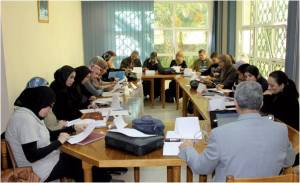Updated
Repairing the neglect of workforce development in the MENA region – J. AbiNader

WORLD BANK: The Arab Spring, and its call for jobs and dignity, offers opportunities to adopt a new development model that benefits all citizens. New report offers formula for seizing opportunities.
*World Bank has 5 messages for MENA in “Jobs for Shared Prosperity“*

Jean R. AbiNader, Exec. Dir., Moroccan American Trade & Investment Center
MATIC, by Jean R. AbiNader (Washington, DC, April 18, 2013) — The World Bank has issued its fourth volume in the series Jobs for Shared Prosperity – Time for Action in the Middle East and North Africa. Well over 300 pages, the study provides its five main messages separately for those who need a super condensed summary. Reading through the messages, I noticed how clear it is that very few results can be achieved without strategies that integrate the resources and talents of the public and private sectors. Drawing on my experiences across the MENA region, there is much to be gained from cross-border sharing of best practices regardless of the differences in the economic profiles of the countries. Let’s look at the region in terms of the key messages of the study.
Message #1:
Labor markets in the MENA make poor use of the available human talent and resources, thus inhibiting the economic potential of countries and people in the region.
Current political dislocations aside, Arab countries, like much of the developing world, made post-independence choices that centralized economic growth around government institutions. Despite dramatic changes in society since then in population, education, middle class composition, ethnic/minority/gender issues, global market standards, etc., governments were slow to accommodate to the realities of today’s economies. Concurrently, vested interests working with their government counterparts too often dominated the private sector. This cronyism added to the obstacles inhibiting progressive economic policies. Human capital was collateral damage in this scenario since labor had little impact on employment standards in a system of regulated government-social services and little flexibility in labor markets.
Despite dramatic changes in society since then in population, education, middle class composition, ethnic/minority/gender issues, global market standards, etc., governments were slow to accommodate to the realities of today’s economies. Concurrently, vested interests working with their government counterparts too often dominated the private sector. This cronyism added to the obstacles inhibiting progressive economic policies. Human capital was collateral damage in this scenario since labor had little impact on employment standards in a system of regulated government-social services and little flexibility in labor markets.
Message #2:
Change the rules to create a dynamic private sector that capitalizes on the full range of the region’s human capital.
 Government business regulations have been slow to shed their opacity; end interference in the business of business, and equitably protect the rights of owners and employees. A major incentive towards transparency is that all MENA countries require foreign direct investment (FDI), which requires attention to rule of law, accountability by government officials, and awareness of environmental impact. The World Trade Organization (WTO), bilateral trade agreements, and a host of multilateral treaties have helped shine a light on changes that must be made for an economy to be competitive.
Government business regulations have been slow to shed their opacity; end interference in the business of business, and equitably protect the rights of owners and employees. A major incentive towards transparency is that all MENA countries require foreign direct investment (FDI), which requires attention to rule of law, accountability by government officials, and awareness of environmental impact. The World Trade Organization (WTO), bilateral trade agreements, and a host of multilateral treaties have helped shine a light on changes that must be made for an economy to be competitive.
Message #3:
Let skills flow into productive private sector jobs by realigning employment conditions in both the private and the public sector and rethinking labor regulation. Lower the barriers holding back women who want to work.
 MENA governments can no longer be the employers of first or last resort. Coddling public sector employees in non-productive jobs limits economic efficiencies and distorts opportunities. Efforts to enhance the employment of youth and women will be advanced through adopting unemployment policies that enable transitions to the labor force and access to services that respect the needs of working families.
MENA governments can no longer be the employers of first or last resort. Coddling public sector employees in non-productive jobs limits economic efficiencies and distorts opportunities. Efforts to enhance the employment of youth and women will be advanced through adopting unemployment policies that enable transitions to the labor force and access to services that respect the needs of working families.
Message #4:
Make young people employable by closing information gaps, improving quality and relevance of skills, and partnering with the private sector in training.
These steps have become the mantra of US, international and local government programs to advance employment among young people. An interesting corollary to this focus on training programs is providing recognition to those who have acquired skills informally, through on-the-job experience. Morocco is piloting a program called Validation des Acquis de l’Experience Professionelle (VAEP) to provide accreditation to workers who can demonstrate proficiencies that qualify them for advanced positions. Piloted through a cooperative agreement with the French government, VAEP originally started with the building trades in 2008, was expanded to textiles and clothing in 2011, and is poised to move into hospitality and meat processing. The bottom line is that professional skills validation through transparent proficiency examinations will “make it possible for employees to obtain diplomas or certificates outside of their initial schooling,” according to the article in Le Soir.
Morocco is piloting a program called Validation des Acquis de l’Experience Professionelle (VAEP) to provide accreditation to workers who can demonstrate proficiencies that qualify them for advanced positions. Piloted through a cooperative agreement with the French government, VAEP originally started with the building trades in 2008, was expanded to textiles and clothing in 2011, and is poised to move into hospitality and meat processing. The bottom line is that professional skills validation through transparent proficiency examinations will “make it possible for employees to obtain diplomas or certificates outside of their initial schooling,” according to the article in Le Soir.
Message #5:
Use short-term interventions to respond to immediate needs while building credibility and consensus for medium-term, game changing reforms.
 Demands for jobs, training, market-focused education, and transparency will not be satiated by government promises. Public-private partnerships can be a critical vehicle for identifying quick start-up projects and programs that support jobs for those marginalized and underutilized in current labor markets. Government subsidies for employment can be used more efficiently when tied to needs identified by current and future employers. The success of longer-term reforms of labor regulations, jobs training and education, gender-related policies, and workplace health and safety rules can be facilitated by piloting initial efforts at these reforms in short-term programs that deliver jobs and generate data that supports new policies.
Demands for jobs, training, market-focused education, and transparency will not be satiated by government promises. Public-private partnerships can be a critical vehicle for identifying quick start-up projects and programs that support jobs for those marginalized and underutilized in current labor markets. Government subsidies for employment can be used more efficiently when tied to needs identified by current and future employers. The success of longer-term reforms of labor regulations, jobs training and education, gender-related policies, and workplace health and safety rules can be facilitated by piloting initial efforts at these reforms in short-term programs that deliver jobs and generate data that supports new policies.
 The World Bank’s Jobs for Shared Prosperity, like the Arab Human Development Reports of a decade ago, offers a serious and methodical critique of how to take an under-performing region and enhance its prospects by freeing its most abundant resource – its people – from antiquated and ineffective labor constraints. Empowering employees is at the heart of building local stability and prosperity in the MENA, and it is an agenda that can no longer be postponed.
The World Bank’s Jobs for Shared Prosperity, like the Arab Human Development Reports of a decade ago, offers a serious and methodical critique of how to take an under-performing region and enhance its prospects by freeing its most abundant resource – its people – from antiquated and ineffective labor constraints. Empowering employees is at the heart of building local stability and prosperity in the MENA, and it is an agenda that can no longer be postponed.
Jean R. AbiNader is Executive Director of the Moroccan American Trade and Investment Center